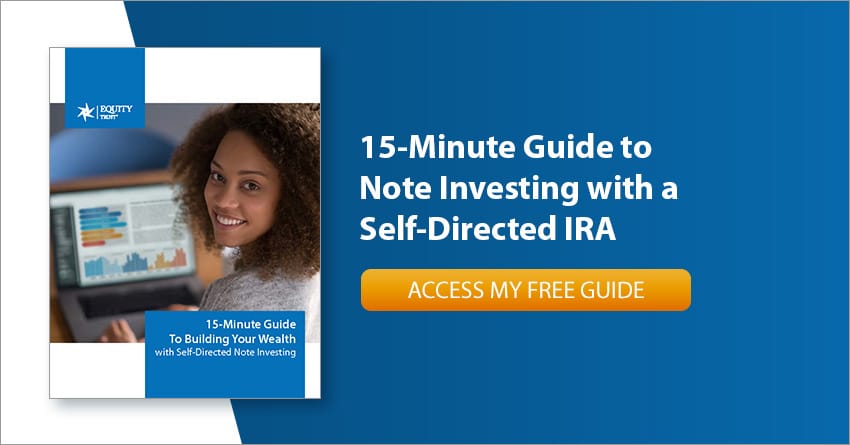Nearly Limitless Options
in One IRA
Invest in both traditional and alternative assets with a single custodian – ready to go beyond a self-directed IRA?
If you are a former Midland Trust client, please click here to log in to your account. Looking for account resources? Click here.
Investor Insights Blog|Key Fundamentals of the Note Business: Part I
Promissory Note Investing

The following was written by guest blogger Aaron Halderman, owner of NoteWorthyUSA.com.
 I want to discuss a key fundamental of the note business. What determines the value of a note?
I want to discuss a key fundamental of the note business. What determines the value of a note?
“Price is what you pay. Value is what you get.” – Warren Buffett
Sometimes, I like to talk about my big “A-ha!” moment. And for me, it came when I realized this stuff isn’t brain surgery. There is a knowledge base you’ll get from notes that will change how you look at real estate forever and ever.
Basically, there are two ways to make money from real estate. One is to find a property, maybe fix it up and sell it; the other is through real estate notes. If you’re addicted to sawdust and power tools, I can’t help you there. But if you love cash flow, I definitely have the fix.
It’s not voodoo math either. It’s about understanding some simple financing techniques.
But the very first thing we need to do is learn how to value the note.
The Warren Buffett quote above is especially interesting when you learn that Berkshire Hathaway, the Oracle of Omaha’s investment vehicle, is the largest originator and purchaser of notes on manufactured homes.
I expect that Mr. Buffett knows as well as anyone in the business that when it comes to buying real estate-backed notes, price is irrelevant until value is determined.
For me, as someone who’s been in this business my entire adult life, value comes down to six key factors. In this article, we’ll discuss the first three and in Part II we’ll go over the rest.
Factors one and two are the most important regardless of note type, whereas the other four have varying degrees of importance, depending on the type of note being considered (e.g., performing, re-performing and non-performing).

Most investors pay too little attention to the borrower, which is a strategy that often leads to poor and often costly buying decisions.
When buying, modifying, or even creating a note, you should always ask to see the borrower’s credit score, income statement, balance sheet, and employment verification. This will provide the best insight into how the borrower will perform on the note.
In my experience, a credit score below 600 is often the first red flag.
It doesn’t mean I won’t buy the note – but it sure does impact the price I’m willing to pay. And just like any investment… the higher the risk, the lower the price.
Conversely, I consider borrowers with credit scores above 675 as low risk, at least in terms of their creditworthiness.
It’s important to balance this concept of creditworthiness against other criteria, like the size of the down payment or equity in the property, which, as you may have noticed, is my third key factor.
I have a higher tolerance for a lower down payment if the borrower has over a 675 credit score and is gainfully employed with a decent debt-to-income ratio, as determined by the income statement. (A borrower’s debt-to-income ratio can be determined by dividing monthly debt by gross monthly income.)
Typically, I prefer a debt-to-income ratio at or below 36 percent.
Similarly, I like to see a housing expense-to-income ratio at or below 28 percent (calculated by dividing monthly housing expenses by gross monthly income).
The basic idea is that you’re looking for a borrower with not only the propensity to pay but, more importantly, the ability to do so.
Video: Basics of Note Investing in an IRA
Without question, the best notes available today are on owner-occupied single-family homes, small multi-family units, and commercial real estate.
The riskiest are industrial properties, and I would advise you to steer clear of them – along with vacant land and manufactured homes.
Industrial properties carry some serious risks, most notably possible contamination or other waste hazards which could become very costly.
Vacant land involves some extra consideration, such as zoning, potential property improvement, location, and overall usefulness of the property.
And although notes on manufactured homes can be profitable – that’s why Berkshire Hathaway has a stake – these properties are very different from single-family homes. Manufactured homes do not maintain their value as well.
In general, notes on vacant land, manufactured homes and industrial properties have the most risk, because there are many more factors involved in determining the value of these properties.
So, if the worst-case scenario in a note investment is getting stuck with the property, my advice is to stick to single-family homes, small multi-family units, and commercial real estate.
In today’s market, notes on these premium property types are by far the easiest to value.
Hedge funds are buying non-performing notes on these properties, modifying them, and then selling them as re-performing notes. Additionally, private individuals are selling their seller-financed notes on these property types in numbers not witnessed since the late 1980s.
Why pile on additional risk? My advice is to follow the easy money.
The basic concept here is “skin in the game.” Look for a borrower that has a financial stake in the property.
The larger the borrower’s investment in the property, the more likely he/she will continue making payments (i.e., “perform” on the note).
But, again, this is more of a balancing act than a straightforward calculation. As previously mentioned, it’s always prudent to weigh the size of the borrower’s down payment and overall investment in the property against his/her credit score.
Personally, I tend to tolerate a down payment as low as 5 percent, if the borrower’s credit score exceeds 625. Inversely, if his/her credit score is below 625, I prefer a down payment of at least 15 to 25 percent.
I never focus on just one factor – finding the sweet spot is always about weighing all factors.
Read Key Fundamentals of the Note Business: Part II to learn about the final three factors to consider.
About Aaron Halderman
Aaron Halderman has over 15 years of real estate development, distressed debt management, and financial services experience. Aaron owns NoteWorthyUSA.com and is the publisher of the NoteWorthy Newsletter and host of two annual note investing conferences, the NoteWorthy Investors Summit & National Convention. Aaron was a managing partner for a private investment company that acquired over 2,000 single-family assets nationwide and managed over $100 million in note investments.
Aaron holds a Bachelor’s degree in Science from Arizona State University. Aaron loves spending time with his children, traveling, golfing, and following sports stats.
Aaron Halderman is not an employee of Equity Trust Company. Opinions or ideas expressed are not necessarily those of Equity Trust Company nor do they reflect their views or endorsement. These materials are for informational purposes only. Equity Trust Company, and their affiliates, representatives and officers do not provide legal or tax advice. Investing involves risk, including possible loss of principal.
Equity Trust Company is a directed custodian and does not provide tax, legal or investment advice. Any information communicated by Equity Trust is for educational purposes only, and should not be construed as tax, legal or investment advice. Whenever making an investment decision, please consult with your tax attorney or financial professional.
You are leaving trustetc.com to enter the ETC Brokerage Services (Member FINRA/SIPC) website (etcbrokerage.com), the registered broker-dealer affiliate of Equity Trust Company. ETC Brokerage Services provides access to brokerage and investment products which ARE NOT FDIC insured. ETC Brokerage does not provide investment advice or recommendations as to any investment. All investments are selected and made solely by self-directed account owners.
Continue